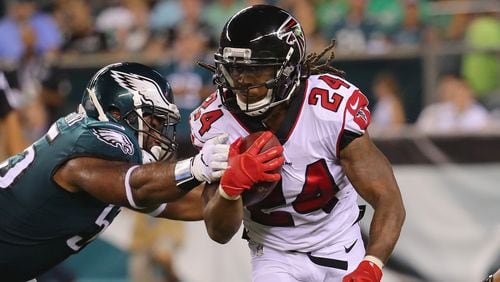A Falcons injury report makes any home remodeling estimate look spot-on accurate by comparison. Every team low-balls. This team has turned it into an art form. If we have learned nothing else this season, take whatever it says about the state of an injured player and add at least 20 percent more pain. That’s just good business.
Thus, when the Falcons report that running back Devonta Freeman will miss a minimum of eight games following groin surgery, experience tells me to assume he is lost for the season.
Freeman and his ever-expanding medical file have moved to the forefront of the conversation about how much is too much to invest in a running back. Especially a 209-pound running back who carries the ball with the attitude of a 250-pound fullback. As the dental tool with sledgehammer ambitions, Freeman deserves credit.
It was shortly after Freeman and his agent made pre-Super Bowl noises about wanting a big new contract – and after he rushed for 75 yards, one touchdown and whiffed on one important block at the end of that game – that the Falcons obliged. Gave him $41.5 million over five years. Went all in with Freeman while allowing his talented backfield partner Tevin Coleman to play out his rookie deal through this season.
What followed has been the kind of injury-plagued, halting output by Freeman that critics of the deal warned us about. In 2017, the two-time Pro Bowl dual-threat back suffered a pair of concussions and was slowed by a knee sprain come the postseason. With reported knee pain, he appeared in only two games this season (14 carries, 68 yards) before we learned of the groin injury.
The Falcons run game – ranking 29th in the NFL in yards per game – has suffered. And lest you believe the rush is unimportant in this aerodynamic age, the team was fifth-best running the ball in 2016, the Super Bowl season. Yeah, it matters.
In this injury-cursed season, the news of Freeman’s impending surgery was among the least shocking developments, because doing without him has, regretfully, become the new normal. It could remain that way. The ground isn’t getting any softer. And so much of his pay will count against the Falcons salary cap for at least two seasons yet that there is no simple way to move on if the injuries keep compounding. This is a real pickle, although front office types might employ a choicer word or two.
We’re not quite at the worst possible scenario yet, but you can see it from here. The suspicions that the Falcons were over-committing to a running back – given the wear and tear of the position and Freeman’s size and running style – are beginning to set up and cure like concrete.
There is one anomaly at work, make of it what you will. The site Last Word on Sports looked at the Falcons 24 games since the start of the 2017 season – 17 of them in which Freeman played significant snaps, seven he didn’t.
The Falcons haven’t rushed the ball as well without Freeman (2.9 yards per carry) as with him (4.2 yards per carry). That’s to be expected. Yet they have scored significantly more points in those games without him (33) than with him (19).
Matt Ryan’s quarterback rating with Freeman, according to Last Word on Sports: 86.8. Without Freeman: 125.1. He compensates well. Good to know in what looks to be a season of compensation.
Again, we’d suggest that the appearance of a better offense without Freeman is an anomaly, because we’ve seen enough evidence of how good it can be when Freeman is fit.
No numbers are needed to advance the thought that Freeman is so much more entertaining as a runner than as a cautionary budgetary tale. Which label he’ll ultimately wear as a Falcon still hangs in the balance.
About the Author







